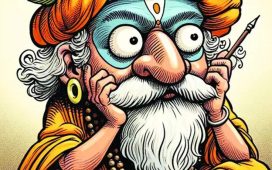When Muruga, the son of Shiv and Parvati, was defeated in a challenge against his sibling Ganesh, he stood on a mountain, disowning his family in a fit of anger. If not for this action of Muruga, his temple in Palani, the most popular pilgrim centre among his devotees, would not have come into existence.
King Parikshit would not have attained liberation, if not for his anger directed at Sage Shamika. He failed to realise that Sage Shamika was in deep meditation when he asked for the whereabouts of the deer he was hunting. Seeing the lack of response from the sage, he tossed a dead snake around the holy man’s neck. He was cursed by the rishi’s son that he would die of snakebite within a week. When Parikshit sought Sage Shuka’s help, the text Srimad Bhagavatam was recited to help him reach his ultimate goal.
Wasn’t the uproar against the British necessary to make ours a free country? In many revolutions, such as the French and the American Revolutions, anger has played a key role in delivering justice to the subdued.
Anger, a double-edged sword, needs careful handling. Right-channelling the energy released due to anger can raise one to great heights. Handled carefully, it is a door to justice and achievement.











